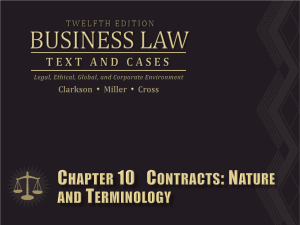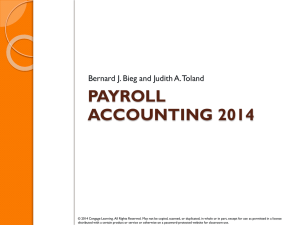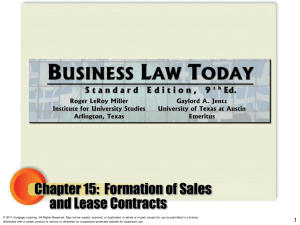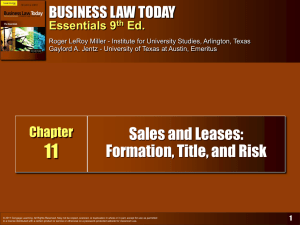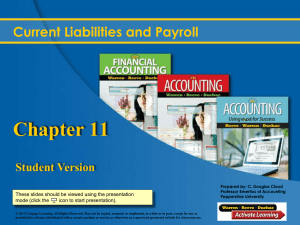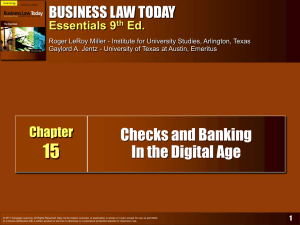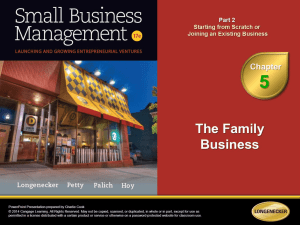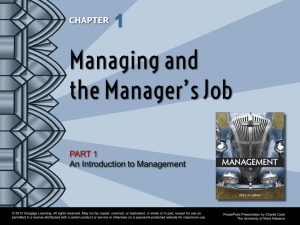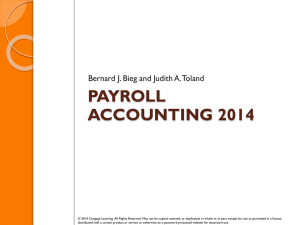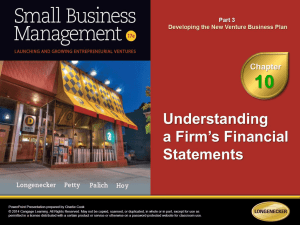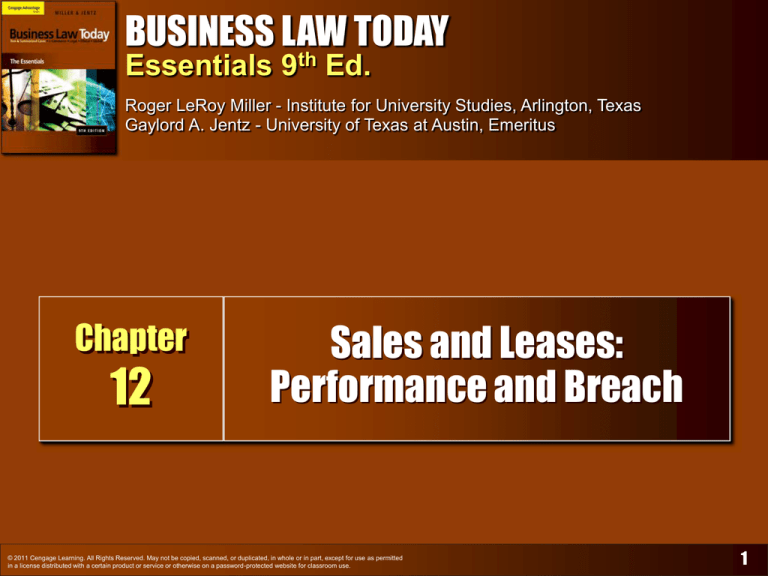
BUSINESS LAW TODAY
Essentials 9th Ed.
Roger LeRoy Miller - Institute for University Studies, Arlington, Texas
Gaylord A. Jentz - University of Texas at Austin, Emeritus
Chapter
12
Sales and Leases:
Performance and Breach
© 2011 Cengage Learning. All Rights Reserved. May not be copied, scanned, or duplicated, in whole or in part, except for use as permitted
in a license distributed with a certain product or service or otherwise on a password-protected website for classroom use.
1
Learning Objectives
What are the respective obligations of the
parties under a contract for the sale or
lease of goods?
What is the perfect tender rule? What are
some important exceptions to this rule
that apply to sales and lease contracts?
What options are available to the
nonbreaching party when the other party
to a sales or lease contract repudiates the
contract prior to the time for
performance?
© 2011 Cengage Learning. All Rights Reserved. May not be copied, scanned, or duplicated, in whole or in part, except for use as permitted
in a license distributed with a certain product or service or otherwise on a password-protected website for classroom use.
2
Learning Objectives
What remedies are available to a seller
or lessor when the buyer or lessee
breaches the contract? What remedies
are available to a buyer or lessee if the
seller or lessor breaches the contract?
In contracts subject to the UCC, are
parties free to limit the remedies
available to the nonbreaching party on
a breach of contract? If so, in what
ways?
© 2011 Cengage Learning. All Rights Reserved. May not be copied, scanned, or duplicated, in whole or in part, except for use as permitted
in a license distributed with a certain product or service or otherwise on a password-protected website for classroom use.
3
Performance Obligations
Good faith and commercial
reasonableness are implied in every
contract.
Seller has a basic obligation to transfer
and deliver conforming goods.
Buyer’s basic obligation is to accept
and pay for conforming goods that are
properly tendered.
© 2011 Cengage Learning. All Rights Reserved. May not be copied, scanned, or duplicated, in whole or in part, except for use as permitted
in a license distributed with a certain product or service or otherwise on a password-protected website for classroom use.
4
Obligations of the Seller or Lessee
Tender of Delivery.
Seller has duty to notify Buyer that conforming goods
are at the disposal of the Buyer to take delivery.
Reasonable place and time.
Place of Delivery (For Tender).
Non-Carrier: Seller’s place of business.
Delivery via Carrier.
• Shipment: Seller must put conforming goods in carrier’s
hands, notify Buyer shipment has been made and
provide relevant documents.
• Destination: Seller agrees to deliver goods at a
particular destination.
© 2011 Cengage Learning. All Rights Reserved. May not be copied, scanned, or duplicated, in whole or in part, except for use as permitted
in a license distributed with a certain product or service or otherwise on a password-protected website for classroom use.
5
Perfect Tender Rule
Seller has duty to ship or tender
conforming goods.
If goods fail to conform to the agreement
in any way, the Buyer has the right to:
Accept the entire shipment.
Reject the entire shipment.
Accept or reject part of the shipment.
© 2011 Cengage Learning. All Rights Reserved. May not be copied, scanned, or duplicated, in whole or in part, except for use as permitted
in a license distributed with a certain product or service or otherwise on a password-protected website for classroom use.
6
Exceptions to Perfect Tender
By Agreement of the Parties.
Exceptions can be established by the sales
contract itself.
Seller can “cure” within time for
performance.
Seller has a right to repair, adjust, or replace
nonconforming goods.
Substitution of Carriers.
If agreed upon carrier is not practicable,
reasonable substitute carrier may tender.
© 2011 Cengage Learning. All Rights Reserved. May not be copied, scanned, or duplicated, in whole or in part, except for use as permitted
in a license distributed with a certain product or service or otherwise on a password-protected website for classroom use.
7
Exceptions to Perfect Tender
Installment Contracts.
Only if substantially impairs value of
installment.
Commercial Impracticability.
Extends only to unforeseeable circumstances.
CASE 12.1 Maple City Farms, Inc. v. City
School District of Elmira (1974). Maple City
sued to cancel the agreement based on 23%
increase in cost of milk. Court held the
increase was foreseeable and not
impracticable.
© 2011 Cengage Learning. All Rights Reserved. May not be copied, scanned, or duplicated, in whole or in part, except for use as permitted
in a license distributed with a certain product or service or otherwise on a password-protected website for classroom use.
8
Exceptions to Perfect Tender
Partial Performance.
If unforeseen event affects partial performance,
seller is obligated to secure remaining
performance via third parties.
Destruction of Identified Goods.
Parties are excused only if the goods were
identified at the time contract was formed.
Assurance and Cooperation.
If reasonable grounds to doubt, then written
assurance. Parties have good faith duty to
cooperate.
© 2011 Cengage Learning. All Rights Reserved. May not be copied, scanned, or duplicated, in whole or in part, except for use as permitted
in a license distributed with a certain product or service or otherwise on a password-protected website for classroom use.
9
Obligations of the Buyer or Lessee
Payment.
Right of Inspection.
C.O.D. Shipment.
Payment Due-Documents of Title.
Acceptance.
Expressly by words or conduct.
Presumed if Buyer had opportunity to inspect
and failed to reject within a reasonable time.
Partial Acceptance.
Buyer does not have to accept less than a
single commercial unit.
© 2011 Cengage Learning. All Rights Reserved. May not be copied, scanned, or duplicated, in whole or in part, except for use as permitted
in a license distributed with a certain product or service or otherwise on a password-protected website for classroom use.
10
Anticipatory Repudiation
Prior to performance, one party
communicates to the other his intention not
to perform.
The non-breaching party can either:
Treat the repudiation as a final breach and pursue a
remedy, OR
Wait to see if the repudiating party will honor its
obligations.
In either case, the non-breaching party may
suspend her own performance.
© 2011 Cengage Learning. All Rights Reserved. May not be copied, scanned, or duplicated, in whole or in part, except for use as permitted
in a license distributed with a certain product or service or otherwise on a password-protected website for classroom use.
11
Anticipatory Repudiation:
Remedies of the Seller
If buyer is in breach, and goods are in
the seller’s possession, seller has the
right to:
Cancel the Contract.
Withhold Delivery.
Resell or Dispose of Goods (Incidental
Damages).
Recover the Purchase Price Due.
Right to Recover Damages.
© 2011 Cengage Learning. All Rights Reserved. May not be copied, scanned, or duplicated, in whole or in part, except for use as permitted
in a license distributed with a certain product or service or otherwise on a password-protected website for classroom use.
12
Seller Remedies: When the
Goods are In Transit
If goods are in transit and seller learns
that buyer is insolvent or will not
perform, it has the right to:
Stop the Carrier and Cancel the Contract.
Resell Goods.
Sue to recover the Deficiency between contract
price and market.
Right to Recover Damages.
© 2011 Cengage Learning. All Rights Reserved. May not be copied, scanned, or duplicated, in whole or in part, except for use as permitted
in a license distributed with a certain product or service or otherwise on a password-protected website for classroom use.
13
Seller’s Remedies: Goods In
Possession of Buyer or Lessee
When Goods are in Buyer’s
Possession, Seller has the right to:
Recover the Purchase Price or Payments
Due.
Right to Reclaim Goods.
© 2011 Cengage Learning. All Rights Reserved. May not be copied, scanned, or duplicated, in whole or in part, except for use as permitted
in a license distributed with a certain product or service or otherwise on a password-protected website for classroom use.
14
Remedies of the Buyer or Lessee
If seller refuses to deliver the goods,
the buyer has the right to:
Cancel the contract.
Obtain goods that have been paid for.
Sue for specific performance.
CASE 12.2 Houseman v. Dare (2009). A dog
can have unique value that requires specific
performance of returning the dog to its owner.
Right of “Cover”: buyer must act in good faith
and without unreasonable delay.
© 2011 Cengage Learning. All Rights Reserved. May not be copied, scanned, or duplicated, in whole or in part, except for use as permitted
in a license distributed with a certain product or service or otherwise on a password-protected website for classroom use.
15
Remedies of the Buyer or Lessee
If seller refuses to deliver the goods,
the buyer has the right to:
Replevy Goods (action to recover specific
goods).
Recover damages (difference between the
contract price and market price).
© 2011 Cengage Learning. All Rights Reserved. May not be copied, scanned, or duplicated, in whole or in part, except for use as permitted
in a license distributed with a certain product or service or otherwise on a password-protected website for classroom use.
16
Remedies of the Buyer or Lessee
If seller delivers non-conforming
goods, buyer has the right to:
Reject Goods: can obtain cover, cancel
contract or sue for damages.
Revoke Acceptance.
• Acceptance based on nonconformity would
be cured.
• If discovery happened after possession.
© 2011 Cengage Learning. All Rights Reserved. May not be copied, scanned, or duplicated, in whole or in part, except for use as permitted
in a license distributed with a certain product or service or otherwise on a password-protected website for classroom use.
17
Remedies of the Buyer or Lessee
If seller delivers non-conforming goods,
buyer has the right to:
Recover Damages for Accepted Goods.
• Buyer may keep goods and sue for damages
(difference between value of goods as accepted and
value if delivered as warranted).
• What is a reasonable to revoke acceptance?
CASE 12.3 Fitl v. Strek (2005). Fitl bought
baseball card from Strek. Two years later learned it
was defective. Court held for Fitl and awarded him the
purchase price of $17,750.
© 2011 Cengage Learning. All Rights Reserved. May not be copied, scanned, or duplicated, in whole or in part, except for use as permitted
in a license distributed with a certain product or service or otherwise on a password-protected website for classroom use.
18
Limitation of Remedies
Parties can agree to limit remedies.
Parties can expressly agree to provide
additional remedies than available under
UCC.
Exclusive Remedies: Parties can agree
that a particular remedy is exclusive (the
only remedy available).
Limitations on Consequential Damages.
© 2011 Cengage Learning. All Rights Reserved. May not be copied, scanned, or duplicated, in whole or in part, except for use as permitted
in a license distributed with a certain product or service or otherwise on a password-protected website for classroom use.
19
Statute of Limitations
Action for breach of contract under UCC
must commence within four years after
the injury.
Plus, injured party must give adequate
notice of injury to other party within a
reasonable time.
© 2011 Cengage Learning. All Rights Reserved. May not be copied, scanned, or duplicated, in whole or in part, except for use as permitted
in a license distributed with a certain product or service or otherwise on a password-protected website for classroom use.
20

